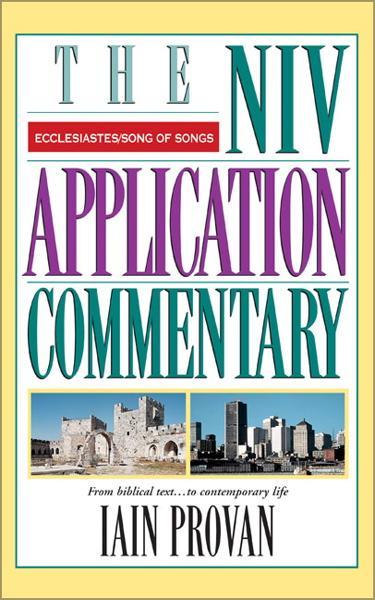Ecclesiastes, Song of Songs (NIV Application Commentary)
Provan, Iain
Ecclesiastes and Song of Songs have always presented particular challenges to their readers, especially if those readers are seeking to understand them as part of Christian Scripture. Ecclesiastes regularly challenges the reader as to grammar and syntax. The interpretation even of words which occur frequently in the book is often unclear and a matter of dispute, partly because there is frequent word-play in the course of the argument. The argument is itself complex and sometimes puzzling and has often provoked the charge of inconsistency or outright self-contradiction. When considered in the larger context of the OT, Ecclesiastes stands out as an unusual book, whose connection with the main stream of biblical tradition seems tenuous. We find ourselves apparently reading about the meaninglessness of life and the certainty of death in a universe in which God is certainly present but is distant and somewhat uninvolved. When considered in the context of the NT, the dissonance between Ecclesiastes and its scriptural context seems even greater; for if there is one thing that we do not find in this book, it is the joy of resurrection. Perhaps this is one reason why Ecclesiastes is seldom read or preached on in modern churches.
The Song of Songs (also known as the Song of Solomon) has been read, historically, by Christians, in two primary ways—as a text which concerns the love and sexual intimacy of human beings and as a text which uses the language of human love and intimacy to speak of something else—the relationship between Christ and the church. Christians have often felt that they must choose between these options—that a text about human love and sexual intimacy could not be at the same time a spiritual text. It is one of the challenges of reading the Song to explore how far this is necessarily true and how far Christian readers have been influenced in their reading more by Platonism and Gnosticism than by biblical thinking about the nature of the human being and of human sexuality. Another challenge is to discover whether the Song is really one “song” at all, or simply a haphazard collection of shorter poems cast together because of their common theme of love; and still another is to gain clarity on what, precisely, is the connection between the Song and Solomon.
This commentary sets out to wrestle honestly with all the challenges of reading these biblical books—the challenges of reading the texts in themselves, and the challenges of reading them as intrinsic parts of Christian Scripture. Using the standard structure of the NIVAC series, it explores their “original meaning,” the “bridging contexts” that enable their journey to the present, and their “contemporary significance.” In the course of the exploration, these books are seen to be deeply relevant in what they have to say both to the contemporary church and the contemporary culture.
About the NIVAC Series
The NIV Application Commentary Series is unique. Most Bible commentaries help us make the journey from our world back to the world of the Bible. They enable us to cross the barriers of time, language, and geography that separate us from the biblical world. Yet they only offer a one–way ticket to the past and assume that we can somehow make the return journey on our own. Once they have explained the original menaing of a book or passage, these commentaries give us little or no help in exploring its contemporary significance.Recently, a few commentaries have included some contemporary application as one of their goals. Yet that application is often sketchy or moralistic, and some volumes sound more like printed sermons than commentaries.
The primary goal of the NIV Application Commentary Series is to help you with the difficult but vital task of bringing an ancient message into a modern context. The series not only focuses on application as a finished product but also helps you think through the process of moving from the original meaning of a passage to its contemporary significance. These are commentaries, not popular expositions. They are works of reference, not devotional literature.
The format of the series is designed to achieve the goals of the series. Each passage is treated in three sections: Original Meaning, Bridging Contexts, and Contemporary Significance.
-
Cover Type
-
ISBN
-
Page Count
-
Publisher
-
Publication Date
-
Books of the Bible









